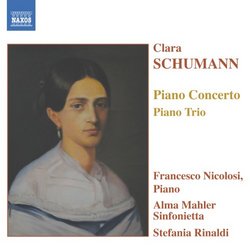| All Artists: Clara Wieck Schumann, Stefania Rinaldi, Alma Mahler Sinfonietta, Francesco Nicolosi Title: Clara Schumann: Piano Concerto; Piano Trio Members Wishing: 0 Total Copies: 0 Label: Naxos Release Date: 4/19/2005 Genre: Classical Styles: Chamber Music, Forms & Genres, Concertos, Historical Periods, Classical (c.1770-1830), Instruments, Keyboard Number of Discs: 1 SwapaCD Credits: 1 UPC: 747313255221 |
Search - Clara Wieck Schumann, Stefania Rinaldi, Alma Mahler Sinfonietta :: Clara Schumann: Piano Concerto; Piano Trio
 | Clara Wieck Schumann, Stefania Rinaldi, Alma Mahler Sinfonietta Clara Schumann: Piano Concerto; Piano Trio Genre: Classical
|
Larger Image |
CD Details |
CD ReviewsClara Schumann's Piano Concerto and Piano Trio J Scott Morrison | Middlebury VT, USA | 04/19/2005 (4 out of 5 stars) "Of all the women pianists of the age, Clara Schumann was the paragon. She had a successful career almost alone among women pianists in the mid-19th century. But she did not have a particularly successful career as a composer, although she was certainly talented enough. In those days, it wasn't considered seemly (or, in some quarters, even possible) for a woman to be a composer, and getting performances outside the family circle was nigh impossible. Clara was able to play her piano concerto a few times largely because of her clout as a pianist, but neither it nor the piano trio recorded here was widely known.
The two works recorded here are as different as day and night. The Piano Concerto, written when Clara was only fourteen, is an apprentice work. It feels awkward and cobbled together. Even the first entrance of the piano sounds diffident because the first notes it plays are the passage-work that comprises the second half of the work's initial theme. It's almost as if the pianist has to make its entrance through a side door. The musical language of the concerto is a combination of that of Mendelssohn and of a kind of proto-Chopin. The latter similarity, I suspect, actually draws more from the bel canto melodies of Bellini than from Chopin. In this performance pianist Francesco Nicolosi does as much as can be expected with the work, and he is ably, if just a bit tentatively, accompanied by the Alma Mahler Sinfonietta, conducted by Stefania Rinaldi. The Sinfonietta is an orchestra made up entirely of women musicians. The Piano Trio, on the other hand, is quite on a par with other great chamber pieces of the time that include piano. It was written ten years after the Concerto and is both assured and original. In four movements, it is marked by memorable melodies and easy polyphony used to make a classically balanced work. The fluid contrapuntal weaving of lines is masterful. Indeed, the fugato in the middle of the fourth movement is possibly more assured than that in a similar spot in her husband's more familiar Piano Quintet. Nicolosi is joined by violinist Rodolfo Bonucci and cellist Andrea Noferini in a decent performance. I must comment, though, that the recording of this work by the Dartington Trio (and which also includes Fanny Mendelssohn's Piano Trio) trumps this one with its grace and fire. If you are interested to hear the Piano Concerto, this is the only easily available recorded version. If you are particularly drawn to hear the Piano Trio, I'd suggest you investigate the Dartington's recording, although I will warn you that the latter costs several dollars more than this one. TT=54:00 Scott Morrison" |

 Track Listings (7) - Disc #1
Track Listings (7) - Disc #1